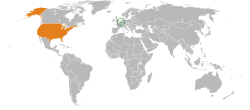Belgium–United States relations
 |
|
Belgium |
United States |
|---|---|
| Diplomatic Mission | |
| Belgian Embassy, Washington, D.C. | United States Embassy, Brussels |
The United States and Belgium maintain a friendly bilateral relationship, despite occasional disagreements on a limited number of foreign policy issues. Continuing to celebrate cooperative U.S. and Belgian relations, 2007 marked the 175th anniversary of the nations' relationship.
According to the 2012 U.S. Global Leadership Report, 26% of Belgians approve of U.S. leadership, with 16% disapproving and 58% uncertain.[1]
History
World War I (1914–1918)
When the Germans invaded Belgium, a neutral territory, the mining engineer and future president Herbert Hoover set up aid organizations: the Committee for Relief in Belgium (CRB) and the National Committee for Help and Food. By the end of the war, these organizations had accumulated a net surplus of $30 million in funds, which was used to improve Belgium's educational system.[2]
World War II (1939–45)
The US helped liberate Belgium from German occupation along with British and Canadian troops as well as Belgian resistance.[3]
Cold War (1946–91)
Belgium received US aid through the Marshall plan, aimed at reconstructing the post-war European economy although Belgian economic recovery predated the Marshall Plan.[4] Both Belgium and the US were among the founding members of NATO, a North Atlantic collective defence alliance. Belgium also participated in the US-led UN mission to repel the North Korean invasion of South Korea during the Korean War.
Post-Cold War (1991–present)
The U.S. appreciates Belgian activism in international affairs, including its participation in the International Security Assistance Force in Afghanistan, its reconstruction and development assistance to Iraq, its peacekeeping missions in the Balkans and Lebanon, its frequent provision of airlift in international crises, and its hosting of 2005 and 2007 transatlantic dialogues between European foreign ministers and the Secretary of State. During the January 17, 2006 visit by Prime Minister Verhofstadt, President Bush thanked him for his "leadership" in helping "the people of the Congo realize their full potential." The U.S. continues to believe that Belgium could be even more active in sharing international security concerns.
As an outward-looking nation, Belgium works closely with the United States bilaterally and in international and regional organizations to encourage economic and political cooperation and assistance to developing countries. Belgium has welcomed hundreds of U.S. firms to its territory, many of which have their European headquarters there.
Principal U.S. officials
- Ambassador – Denise Bauer
- Deputy Chief of Mission – Wayne Bush
- Political Counselor – Theodore H. Andrews
- Economic Counselor – Richard Eason
- Management Counselor – Kathleen Austin-Ferguson
- Commercial Counselor – Paul Kullman
- Regional Security Officer – Kevin W. Bauer
- Public Affairs Counselor – Kathleen L. Boyle
- Consul General – Colwell C. Whitney
Diplomatic missions
- U.S. Embassy in Belgium is in Brussels
- European Logistical Support Office (ELSO) is in Antwerp
- US Mission to NATO in Brussels
- US Mission to the EU in Brussels
See also
References
- ↑ U.S. Global Leadership Project Report - 2012 Gallup
- ↑ Piette, Alain (2007). David Leninson, Karen Christensen, eds. Global Perspectives on the United States: A Nation by Nation Survey. 1. Great Barrington, MA: Berkshire Publishing Group. pp. 43–5. ISBN 978-1-933782-06-5.
- ↑ "The Liberation of Belgium - September - November 1944". Adapted from an account by historian Terry Copp, published in Legion Magazine. Retrieved 23 October 2010.
- ↑ Ian Vasquez (9 May 2003). "A Marshall Plan for Iraq?". Cato Institute. Retrieved 23 October 2010.
![]() This article incorporates public domain material from the United States Department of State website http://www.state.gov/r/pa/ei/bgn/index.htm (Background Notes). U.S.-BELGIAN RELATIONS
This article incorporates public domain material from the United States Department of State website http://www.state.gov/r/pa/ei/bgn/index.htm (Background Notes). U.S.-BELGIAN RELATIONS
External links
![]() Media related to Belgium – United States relations at Wikimedia Commons
Media related to Belgium – United States relations at Wikimedia Commons
.svg.png)